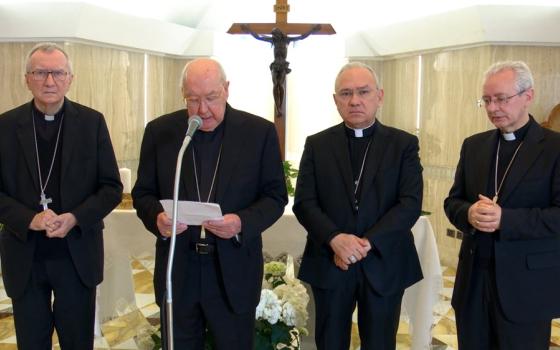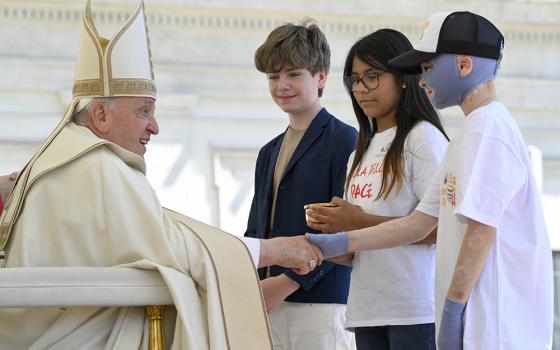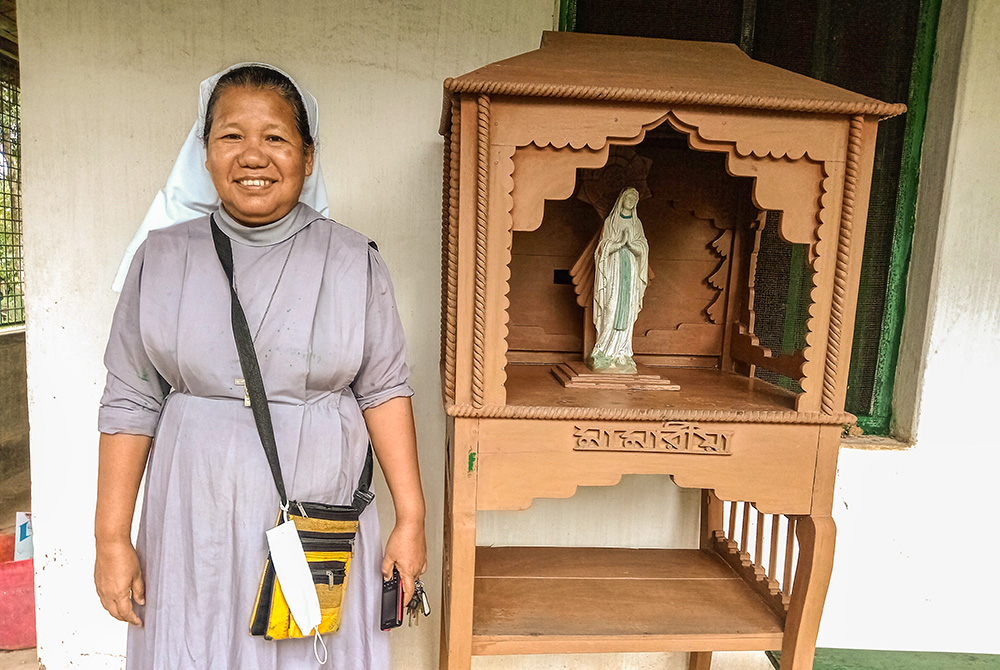
Sr. Baptista Rema, Salesian Sister of Mary Immaculate, at Our Lady of Lourdes Hospital in Baromari, Sherpur, Bangladesh (Sumon Corraya)
Sr. Baptista Rema, a Salesian Sister of Mary Immaculate, has spent the last 15 years saving the lives of snakebite victims in Baromari, Sherpur, a rural area near Bangladesh's northern border with India known for its venomous snakes. At Our Lady of Lourdes Hospital, Rema is in charge of treating an average of one to two snakebite cases daily — around 400 patients annually.
Her dedicated care has been a lifeline for many, with most of her patients coming from the local Muslim and Hindu communities.
A unique feature of Rema's practice is her use of a black healing stone as part of a traditional method of treating snakebites. Her methods often combine traditional and modern approaches.
The region struggles with high mortality rates. Limited awareness and hesitation to seek prompt medical care exacerbate the problem. Studies indicate that approximately 7,000 people die from snakebites in Bangladesh each year — fatalities that could often be avoided with timely administration of antivenin.
In a recent conversation with Global Sisters Report, Rema discussed her work, the challenges of treating snakebites in rural Bangladesh, and the additional health care services offered by her team at Our Lady of Lourdes Hospital. Her story highlights the urgent need to raise awareness and improve access to life-saving treatment, while showcasing the blend of traditional and modern practices in her compassionate ministry.
GSR: Can you tell us about your hospital's services?
Rema: Our hospital was established in 1946 by martyr Sister Mary Immaculate, a French missionary who dedicated 26 years of her life to serving the people of Bangladesh. It is the first and only hospital in this region, providing essential medical care to thousands of [needy] people. Before the hospital was founded, many lives were tragically lost due to the lack of health care facilities, as recounted by our nuns.
Sister Mary Immaculate gave her life during the Bangladesh Liberation War, dying on June 8, 1971. In recognition of her extraordinary sacrifice and service, the French government posthumously awarded her the Legion d'Honneur the same year.
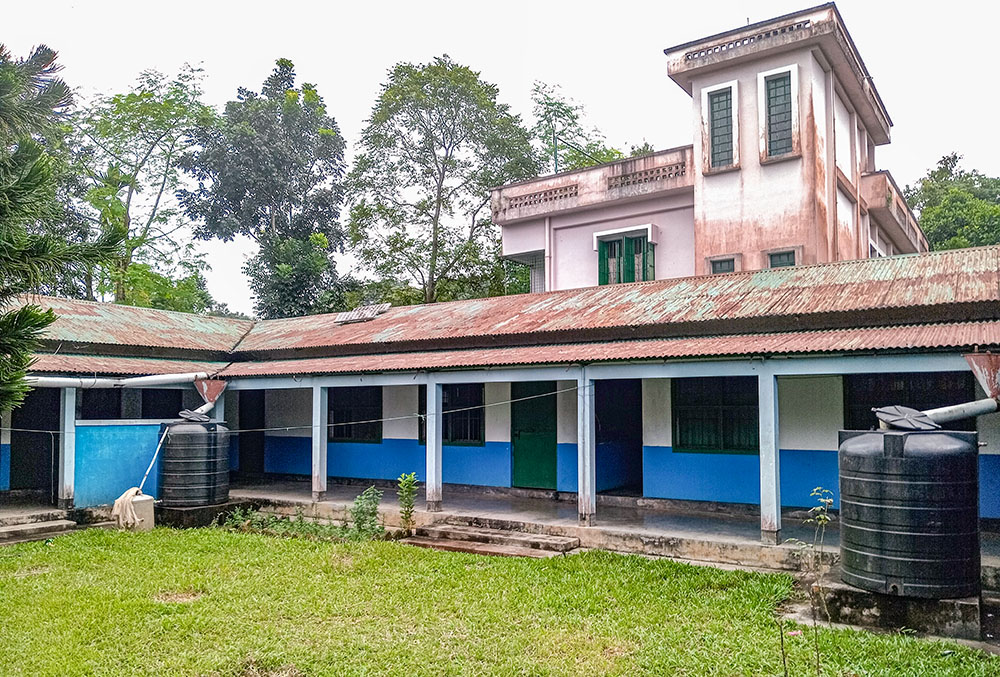
Our Lady of Lourdes Hospital in Baromari, Sherpur, Bangladesh (Sumon Corraya)
The hospital was established with the mission to deliver quality health care to the needy people of this area. The community here — Christians, Muslims and Hindus — lives in harmony and mutual respect, free from conflict. Many impoverished residents cannot afford to travel to larger hospitals in Sherpur or Dhaka for better treatment. Our hospital serves as a beacon of hope for these individuals.
We treat [various] ailments, including skin diseases, fevers, diabetes and snakebite cases. Mothers and children often seek our care, and pregnant women trust us for safe deliveries.
Our treatment costs are minimal, covering only the basic expenses for food and medicines, ensuring that even the poorest can access quality health care. We are proud to continue Sister Mary Immaculate's legacy of compassionate service.
Please tell us about the snakebite victims service in your hospital.
Our hospital, located in the Baromari Parish of Sherpur near the Indian border, is in an area with mountains and forests, making it a habitat for many snakes. Unfortunately, snakebites are common here, with people often being bitten at night while they sleep, returning from the market after dark, or working in the farmland.
We have been treating snakebite victims for many years, and our reputation has spread, bringing patients to us from near and far.
When a patient arrives, we first assess the symptoms of the snakebite. Snakebites can cause pain, swelling, nausea and sweating, while severe cases may lead to breathing difficulties, paralysis or bleeding disorders. Immediate medical attention is crucial to prevent complications and save lives.
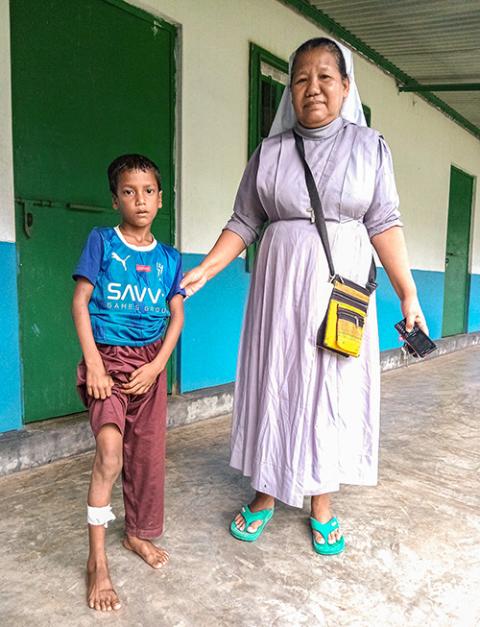
Moaj Islam, 10, shows his snakebite injury as Sr. Baptista Rema accompanies him at Our Lady of Lourdes Hospital in Baromari, Sherpur, Bangladesh. (Sumon Corraya)
We see the highest number of snakebite cases between June and October, when the heat forces snakes out of their nests, increasing the risk of human encounters. Sadly, in the past three years, at least four people in our area have lost their lives to snakebites.
Our treatment begins by cleaning the bite wound with alcohol and making a small incision with a blade. We also use a traditional remedy — a black stone brought from France. This stone, believed to draw venom from the wound, is applied directly to the bite site. While traditional remedies like the black stone are part of our treatment, modern medical care, including antivenin, is the most effective and scientifically proven way to treat snakebites.
Recovery from a venomous snakebite can take anywhere from one week to a month, depending on the severity of the case. Once the patient has fully recovered, we discharge them.
We remain committed to providing life-saving care and raising awareness to reduce fatalities caused by snakebites in our community.
What are the challenges of your ministry, and how do you overcome these?
One of the biggest challenges is financial hardship among the people we serve. Most residents in our area earn less than 1,000 Bangladeshi taka [approximately US$8] per month. This makes it difficult for patients to pay the minimal medical costs we charge, which cover necessities like water, electricity and food.
We aspire to modernize our hospital to provide better care, but our limited income prevents us from upgrading facilities and equipment.
Another challenge is the perception among some that, as nuns, we have abundant resources and should provide free services. People often say, "You are sisters; you opened this hospital for charity. Why should we pay you?"
Advertisement
We explain the necessity of covering basic costs, but many still resist, leaving us in a difficult position.
Despite these struggles, we persevere through faith, careful resource management and community support. We continue to advocate for the value of our services and educate people on the importance of sustaining the hospital for the benefit of all. Running the hospital remains challenging, but our mission to serve the needy motivates us to keep going.
Please share some snakebite victim stories.
After recovering from a snakebite, many patients express their heartfelt gratitude. They often say, "Sister, I thought I would die, but through your sincere care, I have been given a second chance at life. Almighty Allah healed me through your hands."
Their thankful faces and eyes speak volumes, conveying emotions that words cannot fully capture. Seeing people who come to us in pain and despair leave with hope and joy fills my heart with happiness. Their respect and love remind us of the impact of our work and motivate us to continue serving.
Would you like to share anything else?
I completed my nursing training at Kumudini Nursing Institute and trained as a village doctor. Our hospital has 15 beds and a small team of four dedicated staff members. We charge an average of 2,000 taka [approximately US$16] for treatment, but many of our patients cannot afford this modest fee. Yet, we continue to provide care, trusting in God's providence.
As a nun, I see my work as a way to share the love of Jesus Christ through compassionate care and good behavior. Our selfless service allows us to be witnesses of Christ in this community.
I am from the Baluchora Parish in the Diocese of Mymensingh. From childhood, I felt a strong desire to serve the needy and neglected, and God has graciously granted me the opportunity to fulfill this calling. My consecrated life brings me immense joy, and I thank God every day for the beautiful life he has given me.






